2017辽宁省沈阳市第二十一中学高一英语课件Module 2 My New Teachers-Reading and Vocabulary.ppt
辽宁省沈阳市第二十一中学高一英语(外研版,必修1)课件Module 2 My New Teachers-Language Points
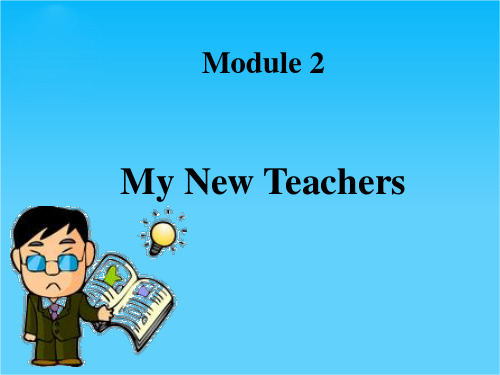
3)don’t feel completely stupid 并不觉 得自己是个大笨蛋 don’t(否定词)和completely,all , both, every, everyone, everything 等表示全部概念的词一起 连用,表示的是部分否定,而非全部 否定。
All is not gold that glitters. =Not all that glitters is gold. 发光的并不都是金子。 Everybody wouldn’t like it. =Not everybody would like it. 并不是每个人都会喜欢它。
She tried to avoid answering my questions. The boy avoided punishment by running away.
I’ve always hated making mistakes or pronouncing a word incorrectly when I speak English, but Mrs Li just smiles, so that you don’t feel completely stupid! 我总是不愿意犯错误或者在说英语时念 错词。李老师只是笑笑,你就不会感到 自己是个大笨蛋。
1) always强调 “一直是这样”。另外, be always doing 表示 “老是, 老……”,多半表示责难,不满或表 扬。 He is always complaining about something.
He was always asking for money.
He is always helping others.
…so that you don’t feel completely stupid! •completely adv. 完全地,十分地 She was completely knocked over by the bad news. I understand it completely.
辽宁省沈阳市第二十一中学高一英语(外研版,必修1)课件Module2MyNewTeachers-Listening,speaking,writing
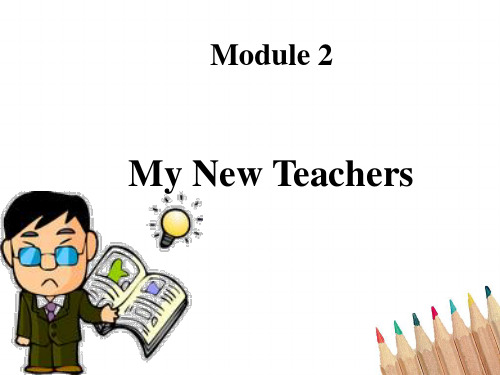
Which subject would you prefer to have? Explain why.
Example:
Student A: What about history and geography? Student B: I’d rather study history than geography because I can learn a lot from many historical figures.
Listen to the conservation again and choose the right answers.
1. Students will have __(b_)__ soon. (a) a vacation (b) exams (c) a test
2. Most of the class want to do __(_a_)___. (a) revision (b) translation (c) comprehension
4. playground / students
The students go into the playground at break and lunch time; it is where they can play games, talk and walk.
5. excellent / good
If you are very good at a subject, your teacher will say you are an excellent student.
6. test / revision
When you have a test, you need to do some revision to check whether you know everything.
辽宁沈阳二十一中英语必修1外研版Module 2-4课件(10张)

(1)非展示 同学背自主学 习部分的短语 和单词。(2) 非点评同学认 真听,大胆质 疑,记好笔记
合作2.C)
Group6 Group5
TASK 课堂检测.1.
展示小组 Group1
课堂检测. 2 Group5
课堂检测.3
课堂检测. 4
课堂检测. 5.6
课堂检测. 7.8
Group3 Group4 Group6 Group7
完全
科学
大声
摘要 成绩 讨厌 承认
Phrase test
• Tell jokes
so…that
• Make a good impression on
• As a result (of) Make progress• do well nfall asleep
• In fact
Check answers
Module 2 My New Teachers
1. 熟记并掌握这一部分单词与短语。 2. 阅读第12页课文,理解课文大意,
提高学生的阅读能力。 3. 认真完成学案,培养学生学习
的积极性,提高口语表达能力。
• 不正确地 地
• 立刻 的
• 文学 地
• 挥手
• 尊敬
• 避开
• 感激
Word test
要求
(1)非展 示同学背自 主学习部分 的短语和单 词。(2) 非点评同学 认真听,大 胆质疑,记 好笔记
Group2
TASK
展示小组 点评小组 要求
合作1.2A)
Group1
合作2.B)Mrs li Group2
合作2.B)Mrs Chen
Group3
合作2.B)Mr Wu Group4
外研版高中英语必修一辽宁省沈阳市二十一中Module 2 My new teachers语言点分类讲解
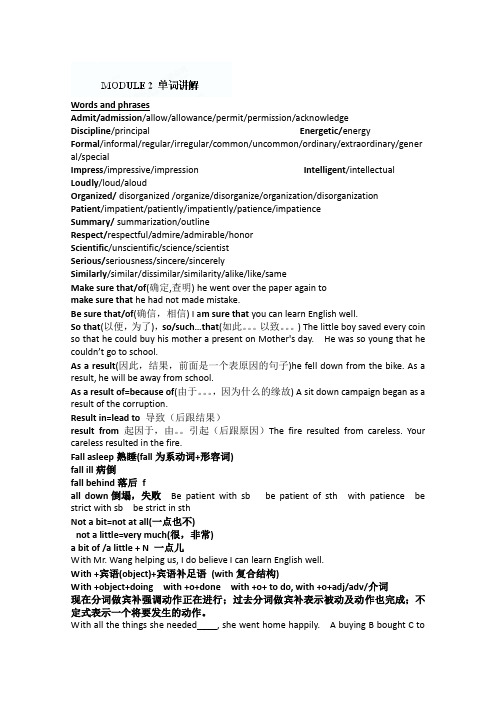
Words and phrasesAdmit/admission/allow/allowance/permit/permission/acknowledgeDiscipline/principal Energetic/energyFormal/informal/regular/irregular/common/uncommon/ordinary/extraordinary/gener al/specialImpress/impressive/impression Intelligent/intellectual Loudly/loud/aloudOrganized/ disorganized /organize/disorganize/organization/disorganizationPatient/impatient/patiently/impatiently/patience/impatienceSummary/ summarization/outlineRespect/respectful/admire/admirable/honorScientific/unscientific/science/scientistSerious/seriousness/sincere/sincerelySimilarly/similar/dissimilar/similarity/alike/like/sameMake sure that/of(确定,查明) he went over the paper again tomake sure that he had not made mistake.Be sure that/of(确信,相信) I a m sure that you can learn English well.So that(以便,为了),so/such…that(如此。
以致。
) The little boy saved every coin so that he could buy his mother a present on Mother's day. He was so young that he couldn’t go to school.As a result(因此,结果,前面是一个表原因的句子)he fell down from the bike. As a result, he will be away from school.As a result of=because of(由于。
辽宁省沈阳市第二十一中学高中英语Module2MyNewTeachers知识点讲解外研版必修1

辽宁省沈阳市第二十一中学高中英语Module 2 My New Teachers知识点讲解外研版必修1【词条1】hate【点拨】hate 多作动词,意为"讨厌,不喜欢"。
如:I hate that kind of animals with long tails (尾巴).People hate being cheated.【上层楼】1. hate作动词多用于hate (doing) sth.或hate to do sth.。
如:Although my grandfather is old, he hates sit ting still and doing nothing.Carrie hated the plan. It made her too tired.注意:hate后跟动名词时多指习惯性的行为或正在进行的动作;后跟不定式多指一次性的行为或未进行的动作。
试比较:The boy hates getting up early every morning.The boy hated to get up early the next day.2. hate 也可作名词,意为"仇恨,憎恨"。
如:She loo ked at the man with eyes full of hate.3. hateful adj. "可恨的,可恶的"。
如:The author takes those people as hateful enemies (敌人).【词条2】appreciate【点拨】appreciate 为动词,意为"欣赏,赞美"。
如:The manager appreciated the new worker’s enthusiasm very much.He r parents don’t appreciate her boyfriend.【上层楼】1. appreciate还可表示"感谢,感激",用于appreciate (doing) sth.或appreciate + that从句。
辽宁省沈阳市第二十一中学高中英语 Module 2 My New Teachers-Period 5教案 外研版必修1

Module 2 My New TeachersPeriod 5Cultural CornerSept 1 Presentation The teacher says,“Different countries have different customs, so different countries have different schools. In this lesson we will learn some differences between schools in different c ountries.”Step 2 Read the passage silently and fast. Answer the following questionsWhat kind of differences in schools in this passage describe?(the relationship between teachers and students. Another difference is whether schools are state schools or private schools)Step 3 Go through each paragraph.Para 1 Questions: What is the relationship between teachers and students in some countries like France and Britain?( The relationship between teachers and students in France is formal. In Britain, relationships are quite relaxed, but the teachers can have big problems with discipline.) Fill in the blanks according to the textThe relationship between teachers and students in Germany, and Spain is ____________ , where _________ and ________ for the teacher is considered very important. The same is ______ ______ Russia.In northern European countries, _________ , the relationship between teachers and students is _____ _______ and _____ _______.In America, students and teachers are quite _______ ______ each other.The Key: quite formal, discipline, respect, true, of, however, much, friendlier, more relaxed, relaxed with.Language Points1)relationship n. 关系relationship between And B with sb (人、团体、国家之间的)关系,联系She has a very close relationship with her sister.她和她妹妹关系非常的亲密。
辽宁省沈阳市第二十一中学高中英语 Module 2 My New TeachersPeriod 1教案 外研版必修1 (2)

Module 2 My New TeachersPeriod 1Teaching content:Introduction vocabulary and listening + SPEAKING + EVERYDAY ENGLISHTeaching Aims and Demands1.New words: amusing, energetic, funny, intelligent, lively, nervous, organized,patient, popular, serio us, shy, strict, stupid…2.Speaking: Expressing preference3.Everyday English: Have you got that? Take a look, kids.That’s settled. It’s up to you.Affection and attitudesUnderstanding how to make a description of a new teacher in Senior High and forming positive attitudes towards the new teachers and their methods of teaching.Learning Strategies1. Learning the adjectives used to describe characters of people and forming the positive and negative attitudes.2. Summing up more and more adjectives used to describe a person.Cultural AwarenessGetting prepared for the descriptions of a teacher, and the relationship between teachers and students in China and other foreign countries.Teaching AidsMulti-mediaTeaching designsTeaching ProceduresI. Introduction vocabulary and listening1. Revision1) Brainstorming: Try to bring out as many adjectives used to describe a person as possible.2) Help the Ss to use the adjectives to describe their favorite teachers, and then get the meaning of the positive adjectives or negative adjectives.2.Lead in the study of the adjectives: Ask each of the groups to write down their positive adjectives and negative adjectives and check the answers themselves.3.Activity 2①Have a discussion about their own favorite teacher’s standard and tick or cross the following statements.②What do you think of Alex’s about the statements? Now listen to the tape and tick or cross the statements.③Compare yours with Alex’s and tell the r eason why.4.Go to Wb. Vocabulary p74.5.II. Speaking1.Pre-task: Ask the Ss to describe their favorite teachers, using the adjectives they have just learned and tell the reasons why.2.Pair work: Ask the Ss to talk about the parts of school life you enjoy most and why. Guidance: I like… better than…, because I ….3.Pair work: Make a dialogue, using the expressions of describing their likes:I enjoy…, because….I prefer…I am not good at … because….4.Exercises about the description of likes.I’d prefer, I’d rather, you would prefer, would also prefer, would preferJason: Hi, Mary. Do you have an English class this morning?Mary: Oh, yes, Jason. This is our first English lesson. I hope that my new teacher is a young girl.(1) ________ to have a beautiful and lively English teacher.Jason: Oh really? (2) _________ learn from an older teacher, because an older teacher is more intelligent I think.Mary: No, I don’t think so. (3) _______ to talk with an energetic and amusing yo ung girl, because I will become nervous if the teacher is strict. (4) ________ to have a relaxed class.Jason: Perhaps you are right. I know Miss Li is a very popular teacher on this campus. Many students (5) ________ to learn from her. If she can teach us, (6) ________ learn from her. Mary: But I think you (7) ________ to follow an older teacher?Jason: Well, I guess that a popular teacher (8) ________ to teach popular students like me.III. Everyday English1.Revise the adjectives and the description of “I prefer…”.2.Group work: Ask the Ss to complete the conversations with the expressions.3.Ask the Ss to describe the meanings of the expressions, matching the following explanations with the expressions given.have a look take a lookchildren kidsHave you been told about that? Have you got that?several things a couple of thingsIt’s now decided that’s settled4.Pair work:Read the short dialogues aloud.IV. Homework:1.Make a description of the following pictures of teachers, using the adjectives used to describe a person and tell the reasons why.点评:从课堂教学的策略来讲,本堂课突出了语言交际能力的培训,并为接下来的课堂教学做好了词汇方面的铺垫。
辽宁省沈阳市第二十一中学高中英语ModuLe2MyNewTeachers外研版必修1
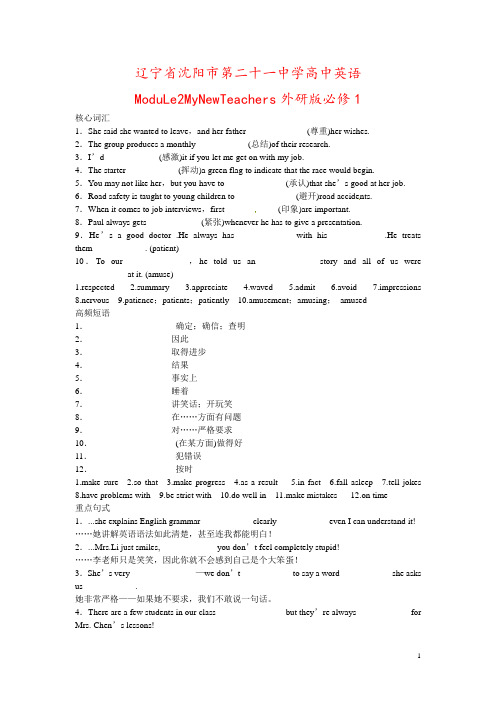
辽宁省沈阳市第二十一中学高中英语ModuLe2MyNewTeachers外研版必修1核心词汇1.She said she wanted to leave,and her father _____________ (尊重)her wishes.2.The group produces a monthly____________(总结)of their research.3.I’d ____________(感激)it if you let me get on with my job.4.The starter____________(挥动)a green flag to indicate that the race would begin.5.You may not like her,but you have to ____________(承认)that she’s good at her job. 6.Road safety is taught to young children to ____________(避开)road accidents.7.When it comes to job interviews,first____________(印象)are important.8.Paul always gets____________ (紧张)whenever he has to give a presentation.9.He’s a good doctor .He always has ____________with his ____________.He treats them____________. (patient)10.To our ____________,he told us an ____________story and all of us were ____________at it. (amuse)1.respected2.summary3.appreciate4.waved5.admit6.avoid7.impressions8.nervous9.patience;patients;patiently10.amusement;amusing;amused高频短语1.________________确定;确信;查明2.________________ 因此3.________________ 取得进步4.________________ 结果5.________________ 事实上6.________________ 睡着7.________________ 讲笑话;开玩笑8.________________ 在……方面有问题9.________________ 对……严格要求10.________________ (在某方面)做得好11.________________ 犯错误12.________________ 按时1.make sure2.so that3.make progress4.as a result5.in fact6.fall asleep7.tell jokes8.have problems with9.be strict with10.do well in11.make mistakes12.on time重点句式1....she explains English grammar____________clearly____________even I can understand it! ……她讲解英语语法如此清楚,甚至连我都能明白!2....Mrs.Li just smiles, ____________ you don’t feel completely stupid!……李老师只是笑笑,因此你就不会感到自己是个大笨蛋!3.She’s very ____________ —we don’t____________to say a word____________she asks us____________.她非常严格——如果她不要求,我们不敢说一句话。
辽宁省沈阳市第二十一中学高一英语(外研版,必修1)课件Module 2 My New Teach
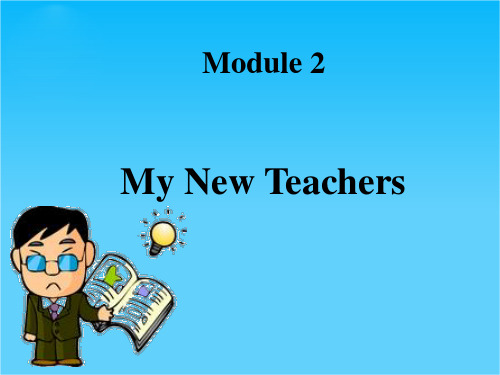
Stars on Earth
Les Choristes
Pretty Big Feet
Not One Less
Zhang Lili is a teacher at the No. 19 Middle School in Jiamusi, Heilongjiang Province. She sustained serious injuries after saving two students from being hit by an oncoming bus on May 8, 2012. She was named “most beautiful teacher” by netizens.
What personal qualities do you
think a good teacher should have?
Work in pairs and talk about your favorite teacher.
You may start like this: One of my favorite teachers is Mr / Miss ____. He / She is a math / English / … teacher. He / She looks _____. I like him / her very much because _________.
Module 2
My New Teachers
Do you know any films about teachers?
What do you think about the position of teacher? If you are a teacher, how do you deal with the relationship with students?
辽宁省沈阳市第二十一中学高中英语 Module 2 My New Teacherswould rather用法 外研版必修1

辽宁省沈阳市第二十一中学高中英语Module 2 My NewTeacherswould rather用法外研版必修1would rather 表示宁愿英语语法would rather表示宁愿一、“would rather+动词原形”是英语中常见的一个惯用句式(美国英语中多用had rather)。
’d rather为would(或had)rather的缩写形式。
wo uld (had)在此决无“过去”之意,且无词性、时态的变化。
该句式常用来表示选择的意愿,意为“宁可……;宁愿……;最好……”。
例如:He'd rather work in the countryside. 他宁可到农村去工作。
If you'd rather be alone, we'll all leave here. 如果你宁愿独自呆着,那我们都离开这儿。
You would rather stay at home and do some reading this evening. 今晚你最好呆在家里看点书。
二、would rather与than连用,可构成另一个惯用句式,即:“would rather...than....”意为“宁可(愿)……(而)不要(愿)……;与其……不如……”。
用以表达主语的意愿,强调经过选择后做其中一件事,而不愿做另一件事。
例如:I would rather watch TV at home than go to the cinema. 我宁可在家看电视而不愿去看电影。
三、在使用“would rather...than...”句型时,应注意以下几点:1. than 后边也应接动词原形,但如该句型前后连接的两个动词相同,则than之后的那个动词可省去。
例如:I'd rather know that now than afterwards. 我宁可现在就知道这件事,而不是以后。
辽宁省沈阳市第二十一中学高中英语 Module 2 My New Teachers Language

我的新任教师
专业导师
我们的新任教师是经验丰富且富 有激情的专业导师,将教会我们 许多有关英语的知识。
团队合作
我们将与同学们一起学习,并借 助团队合作的力量共同进步。
积极参与
我们将积极参与课堂活动,提高 自己的英语表达和听力能力。
语言要点
词汇丰富
我们将学习丰富的词汇,提Βιβλιοθήκη 我们的英语表达 能力。口语表达
我们将锻炼口语表达能力,提高与他人的交流 效果。
语法规则
我们将掌握英语语法规则,准确运用课堂上学 到的知识。
写作技巧
我们将学习有效的写作技巧,提高写作表达能 力。
教训和学习
积极提问
我们应该积极提问,主动学习, 不断探索外语学习的奥秘。
认真做笔记
我们应该认真做笔记,整理课堂 上的重点,方便以后复习。
刻苦学习
学习英语是一项长期的任务,我 们需要刻苦学习,持之以恒。
新的学术挑战
1
读写能力
我们将提升我们的读写能力,从而更好
听力技巧
2
地理解和表达英语。
我们将学习提高我们的听力技巧,从听
力材料中获取有用的信息。
3
口语表达
我们将通过大量的口语练习,提升我们 的口语表达能力。
合作和沟通
团队合作
通过与同学们的合作学习,共同解决问题,形成 良好的学习氛围。
3 进一步学习
我们计划在高中结束后继续深造英语学习,为未来的职业发展做好准备。
结束语和总结
感谢
感谢大家的支持和配合,让我们共同成长。
祝福
祝愿大家在这个课程中取得好成绩,并在英语学习 道路上越走越远。
辽宁省沈阳市第二十一中 学高中英语 Module 2 My New Teachers Language Points课件 外研版必修
辽宁省沈阳市第二十一中学高中英语 Module 2 My New TeachersPeriod 3教案 外研版必修1 (2)

Module 2 My New TeachersPeriod 3Teaching Content:(Reading and vocabulary for revision, Grammar and Writing)Teaching Aims and Demands:Language knowledge1. New words: nervous, patient, serious, amusing, admit, appreciate, avoid, scientific, physics, literature, summaries, respect…2. Grammar: verbs followed by V–ing3. Writing: punctuation usage in writingReading skillUnderstanding how to describe a personAffection and attitudesUnderstanding new teachers and forming positive attitudes towards the studies of all subjects in senior high.Learning strategies1.Categorizing adjectives used to describe characters of people2.Summing up verbs followed by V-ing.3.Learning how to punctuate a paragraph.Cultural awarenessGetting prepared for the comparison of education systems, teacher-student relationship and other aspects between China and foreign countries.Teaching AidsMulti-mediaTeaching ProceduresⅠ. RevisionHelp students to revise words that is learnt in Period Two of this module by doing Activity 2 P13. Help the students to review the adjectives used to describe a person by doing Exercise 5 (Workbook P74).Ask the students to read “My New Teachers” and then check their understanding of the passage by doing Activity 4 P13.Ⅱ. Grammar learningLead in the study of grammar by carrying out the following activities.1.What verbs have you found that can be followed by V-ing from the passage you’ve jus t read? (Ask students to speak out the verbs like “like, avoid, hate, keep, admit ,enjoy”)2.Look at the passage again. Ask the students to find the sentences with the verbs followed by V-ing.(Ask students to underline the sentences in the passage and then Teacher shows them on the screen with the verbs underlined. )Encourage the students to find out themselves why the sentences are written in this way by asking “What do you notice about the verbs that follow the underlined verbs?”(The students may work in pairs.)Collect the answers from the students.( The verbs are followed by the gerund rather than the infinitive used as the object of the verbs underlined.)5.Help the students to sum up the words they’ve learned which can be followed by V-ing.Ⅲ. Language useHelp students to learn to use the verbs followed by V-ing as object.1. Activity 2 P14.2. Get the students to work in pairs introducing each other by using the verbs in Activity 2. And then ask several pairs to act it out in class.3. Activity 3 P14.( Ask the students to write down 3 more true sentences about themselves using the words and then show their work on the screen.)IV. WritingAsk t he students to read any paragraph in “Reading and V ocabulary” again first.Give the students each a piece of paper with the paragraph they’ve just read but without any punctuations or any capitalized words. And ask the students to punctuate this paragraph, using full stops, capital letters, question marks and commas where necessary.( Show the students’ work on the screen and see if the students can do it correctly. There might be some differences from the punctuations used in the passage, but if they are acceptable, they are O.K.)Get the students to discuss why they punctuate the passage like this by asking some questions. Why do you punctuate your passage like this?Why are punctuations important in writingWhat is also important besides punctuations in writing?( Help the students to sum up by themselves how to use punctuations in a passage. And remind them of the importance of punctuation marks and capital letters.)V. PracticeAsk the students to punctuate the passage on P18.(Get the students to work on this individually and then check in pairs and Teacher can show two or three students’ work on the screen, so the students may have a discussion about whose is better and why. In doing this they can practise what they’ve learned just now.)2. If time is allowed, Teacher may prepare another passage without punctuations or capital letters to give the students more practice.3. Ask the students to write a short description of their favourite teacher. Remind the students to use capital letters, commas and full stops where necessary.( If there is still time in class, Teacher can show some students’ work on the screen, or else in the next period.)VI. SummaryGive the students some time to recall what they’ve learned in this class.( Ask the students to think by themselves first, then discuss in pairs and finally share in class.)Ask the students to call out as many verbs as possible which can be followed by V-ing.Get the students to say the adjectives used to modify a person.VII. A test1.To check the verbs followed by V-ing.( Maybe a blank-filling.)To check the adjectives to modify a person.( Maybe orally, for example ask the students to describe their favourite winners of the Olympic gold medals or maybe film stars.)sage without punctuationsHomeworkPrefer to the dictionary and try to get more adjectives used to modify a person.2.Sum up the verbs which can be followed by V-ing and write them down in notebooks. 3.Write a short passage describing their favourite sports stars or film stars, pay attention to punctuations and capital letters.点评:从课堂教学安排来看,本课重点突出以复习上节课所学描述人物时用的形容词,后跟动名次结构的动词,以及英文文章中标点的正确使用而展开的。
辽宁省沈阳市第二十一中学高中英语 Module 2 My New T
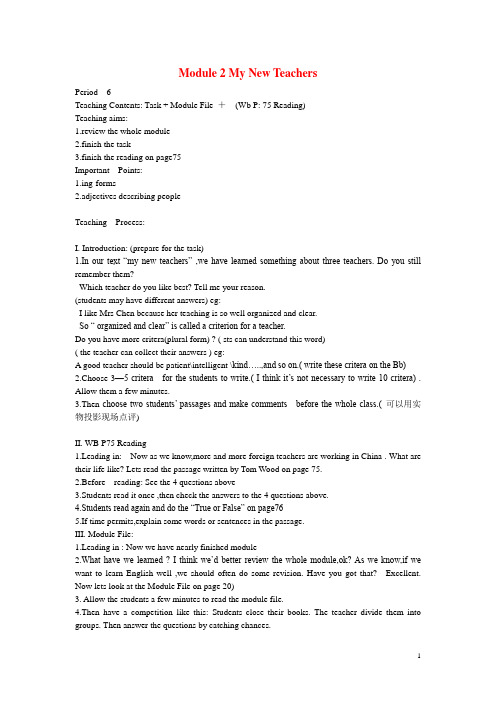
Module 2 My New TeachersPeriod 6Teaching Contents: Task + Module File +(Wb P: 75 Reading)Teaching aims:1.review the whole module2.finish the task3.finish the reading on page75Important Points:1.ing-forms2.adjectives describing peopleTeaching Process:I. Introduction: (prepare for the task)1.In our text “my new teachers” ,we have learned something about three teachers. Do you still remember them?Which teacher do you like best? Tell me your reason.(students may have different answers) eg:I like Mrs Chen because her teaching is so well organized and clear.So “ organized and clear” is called a criterion for a teacher.Do you have more critera(plural form) ? ( sts can understand this word)( the teacher can collect their answers ) eg:A good teacher should be patient\intelligent \kind…..,and so on.( write these critera on the Bb)2.Choose 3—5 critera for the students to write.( I think it’s not necessary to write 10 critera) . Allow them a few minutes.3.Then choose two students’ passages and make comments before the whole class.( 可以用实物投影现场点评)II. WB P75 Reading1.Leading in: Now as we know,more and more foreign teachers are working in China . What are their life like? Lets read the passage written by Tom Wood on page 75.2.Before reading: See the 4 questions above3.Students read it once ,then check the answers to the 4 questions above.4.Students read again and do the “True or False” on page765.If time permits,explain some words or sentences in the passage.III. Module File:1.Leading in : Now we have nearly finished module2.What have we learned ? I think we’d better review the whole module,ok? As we know,if we want to learn English well ,we should often do some revision. Have you got that? Excellent. Now lets look at the Module File on page 20)3. Allow the students a few minutes to read the module file.4.Then have a competition like this: Students close their books. The teacher divide them into groups. Then answer the questions by catching chances.Part one: (words): do translation (English to Chinese and Chinese to English.1 score for each word)Part two (Function and Everyday English): Ask them to make some sentences using them. Eg: Teacher: I told you to read the module file, have you got that?Students:Yes.( review others with them,1 score for each one.)(At the end of the competition, compare the scores of each group and find the winners to reward) 5.Review the grammar rules:(1).Verbs often used with –ing forms:admit\avoid\delay\dislike\enjoy\finish\imagine\keep\mind\practise\suggest\give up\look forward to\be used to \be good at\can’t help(2).often used with “to do”:want\decide\hope\wish\promise\pretend\fail\plan\refuse\manage\expect6.Can be used with both “-ing” form and “to do”:remember\forget\regret\try\stop\go on\mean(Study the following sentences and try to find the differences)I remember posting the letter for you.Please remember to post the letter for me.I regret not having accepted the invitation.I regret to tell you that you are not chosen.He tried to speak English to us.He tried speaking English to us.You can’t start your car?Try filling the tank with hot water.This means setting out at once.He really meant to come.IV.Homework:1.Review the grammar: verbs used with –ing forms2.Prepare for the new module. ( preview the new words in module3.Multiple choices (do it after class, print and hand out the papers to the students )1. ______ to hospital in time, the wounded soldiers were saved at last.A. TakenB. TakingC. having takenD. To take2. –How did you get to the airport?--I got Charlie ______ me there.A. droveB. driveC. drivingD. to drive3. I’ve got a terrible headache. I tried ______ some medicine but it didn’t help.A. to takeB. having takenC. takingD. to have taken4. –Why did you sell this old TV at such a low price?--I did it only because I was made ______ it.A. doB. to do c. doing D. to doing5. –What did Vicky think of your decision?--She ______ to believe that I meant it.A. found that impossibleB. found impossibleC. found which impossibleD. found it impossible6. –Would you join us tonight?--I ______ but I have to prepare for tomorrow’s test.A. would love toB. would love soC. would love itD. would love7. The road ______ the two villages is very narrow.A. joiningB. joinedC. to joinD. to be joining8. He now regrets ______ harder when he was at school.A. not studyB. not studied c. not studying D. not to study9. It’s a pity we didn’t visit Tom. I would like ______ him again.A. seeingB. to seeC. seeD. saw10. They now have a good government, ______ by all the people.A. having supportedB. supportingC. supportedD. to be supported11. He let me repeat his instruction ______ sure that I understood what was ______ after he went away.A. to make, to doB. making, doing c. to make, to be done D. making, to do12. Once your business becomes international, ______ constantly will be part of your life.A. you flyB. flyingC. your flightD. flight13. She can’t help ______ the house because she’s busy making a cake.A. to cleanB. cleaningC. cleanedD. being cleaned14. –What do you think made Mary so upset?--______ her new bicycle.A. As she lostB. LostC. LosingD. Because of losing15. ______ book of this writer is East and West.A. known to be the bestB. It was the best knownC. Known as the bestD. The best known16. On his way home he suddenly heard his name ______.A. callingB. calledC. to callD. call17. He didn’t keep on asking me the time any longer as he had his watch ______.A. to repairB. repairedC. repairingD. repair18. The writer was made ______ to the guest.A. apologizeB. apologizingC. to apologizeD. to be apologizing19. As soon as she entered the room, the girl caught sight of the flowers ______ by her mother.A. buyingB. being bought c. were bought D. bought20. Who is the man ______ now?A. operating onB. operated onC. being operated onD. to be operated on21. He hung up the phone, ______, with a smile on his face.A. having satisfiedB. to be satisfiedC. satisfyingD. satisfied22. She looks forward every spring to ______ the flower-line garden.A. visitB. paying a visitC. walk inD. walking in23. The little girl has a habit of having her hands ______ before meals.A. washB. washedC. washingD. to be washed24. The little time we have together we try ______ wisely.A. spending itB. to spend it c. to spend D. spending that25. Seeing the sun ______ above the surface of the sea, we let out a shout of joy.A. to riseB. to raiseC. rising d. raising1-10 ADAADABCBC11-20ABACCBBCDC21-25DDBCC点评:本课堂教学的安排突显复习课的特点,不仅对本模块所学知识做了比较系统的复习,而且根据本模块中出现的较难语法现象,自编练习题目,使学生及时地感知所碰到过的语法现象,得以不断积累。
辽宁省沈阳市第二十一中学高中英语 Module 2 My New Teachers1教案 外研版必修1 (2)

Module 2 My New TeachersPart One: Teaching Design第一部分教学设计Teaching aims and requirements of the unit●To improve fast and careful reading skills●To widen vocabulary●To improve listening and speaking ability●To improve writing skills●To learn how to set criteriaTeaching procedures:Period 1:Introduction and readingStep 1:Warming up1. Warming up by discussingHello boys and girls, today we are going to learn a lesson My New Teachers, and now I want you to discuss a question: Are first impressions importantEvery one wants to leave a good impression on others, but if an able and outstanding person has behaved badly when he goes to work in a new company the first day, what do you think will happen to him?He will be judged and valued unfairly and it will be difficult for him to be accepted and appreciated by both his workmates and his boss. Then if he wants to succeed, he must work much harder than he should . But he will be accepted sooner or later.If a person is in fact an unable person, but fortunately made a good impression in his workplace, what will happen to him?Every one will consider him as a qualified person. Even if he makes a mistake, people will think it is an unexpected mistake only because of his carelessness.Can first impressions be changed?Of course, they can. We know first impressions are often misleading. But in the long run, wrong first impressions will be corrected2. Warming up by making up sentencesMy father is lively and energetic, but he is not very patient.Uncle Wang is always an amusing storyteller, so he is very popular with the whole neighborhood. Mr. Smith is so serious a maths teacher that children feel nervous when he is present.However difficult a question is, my classmate Li Ming can always give an organized and intelligent answer.My mother is kind and shy but can be very strict in educating us.Mr. Smith is always acting in a funny way.Mike looks stupid when he talks to his mother so rudely.3. Warming up by introducing a personNow, I’ll introduce one of my favorite former teachers. Then I hope I c an get to know one of yours.Key for reference:When I was in Junior Grade 2, I was so lucky to be taught by Mrs. Li as my Chinese teacher. I had always considered Chinese to be boring, but she was so knowledgeable that she made Chinese an interesting subject to learn. She was kind to us. Her lessons were so organized that I could always learn a lot during every period of 45 minutes. I made great progress with Mrs. Li teaching me. After class, she is our good friend. She helps us a lot in solving the problems we meet in our everyday life. But to my regret, she was not very healthy.Step 2: Pre-reading1. Finish Part 3 and Part 4( Page 11).2. Introduce some key new words.Make sure of the meanings of the following words and fill in the blanks. Change the form1)The young man that he stole the money.2)I love reading good .3)Thank you so much. I really your help.4)It’s a very interesting experiment.5)I being late for school.6)Write a of this text. Use about 100 words.7)I try to boring people.8)I you because you work hard and are a good person.9) That was very amusing.10) He is a quick person and can always give answers when asked.11) Someone knocked at the door.(Keys: admitted, literature, appreciate, scientific, hate, summary, avoid, respect, joke, immediately, loudly)Step3 ReadingLead-inBy now we have talked a lot about being a good teacher. Now we are going to learn more about this topic. After reading the text, discuss the following questions.Which teachers do students like a lot?Who is a very good teacher but is serious and strict?Fast reading for the general ideasNow read the text fast again and try to get the main idea of each paragraph.Paragraph I Mrs. Li is patient and tolerant, so she is liked by her students.Paragraph II Mrs. Chen is too strict, but because her teaching is very organized and clear, some students do like her.Paragraph III Mr. Wu is amusing, energetic and he enjoys teaching, so he is very popular.3. Careful reading for details4. Listen to the tape of the text and fill in the gaps.1) They say are very important.2) I’ve always hated mistakes or pronouncing a word when I speak English, but Mrs. Li just smiles, so that you d on’t feel stupid.3) She is very strict –we don’t to say a word unless she asks us to.4) He is about 28, I think, and is rather .5) He talks loudly and fast, and his hands about a lot when he gets excited.6) Even things like compositions and summaries are with Mr. Wu.(Keys: first impressions, making, incorrectly, completely, dare, good-looking, waves, fun)Step4: Reading practiceRead the following passage within 5 minutes and make the best choice to each problem.All children like watching TV and seeing films. And many children act in films, too. Everyday they may work several hours, so they can’t go to school on time every day. But they must get a good education.How do they get an education they need?About forty or more teachers give lessons for the children in the films. They teach them in the places. There their pupils are working for the films.Child actors are required (要求) to attend classes twenty hours a week. The little actors must be taught from September to the middle of June. If they do not get good marks at school, they are not allowed (允许) to go on with the work in films or TV show.The actors are usually good pupils and most of their teachers like this special (特别的) kind of work. Their classes are held in many interesting places where there are many beautiful lakes and mountains. Sometimes the classroom is by the riverside or in a small boat, or in a spaceship. Whenthe child actors grow up, they usually become famous actors.1. Many child actors .A. can go to school every day on timeB. must get a good educationC. must go to school every dayD. don’t go to school2. The teachers teach their child actors in the places where .A. the films are shownB. the films are madeC. the teachers liveD. the boys and girls were born3. Child actors must attend classes twenty hours .A. every yearB. every weekC. every monthD. every season4. Most of the child actors .A. study hard and are good pupilsB. think of their parents when they are outC. love their teachers, but often miss their lessonsD. can’t attend their lessons on time5. When the child actors grows up, .A. all of them must become famous actorsB. some of them will become famous actorsC. none of them likes the filmsD. none of them sees films(Keys: BBBAB)Step5: HomeworkWork in pairs, and discuss the questions.Which paragraphs tell us what the teachers look like?What subjects does each teacher teach?Who is the most popular teacher?Who is the kindest teacher?Which teacher are students most afraid of?Which teachers explain things clearly?Work in pairs, and read the text again. Which teacher do you like best? And why? Learn the new words again, using the dictionary if necessary.。
辽宁沈阳二十一中英语必修1外研版Module1-3课件(34张)

2. __________it is to go swimming on
such a hot day!
A. What fun
B. How fun
C. What a fun
D. How a fun
3. _________ it is to jump into a river to
swim on such a hot day.
His idea received an enthusiastic response. be enthusiastic about over / for sth. 对某事 热心
David is very enthusiastic about the plan. enthusiasm n.热情;狂热; 狂热; 热情,激 情
年轻人对电脑游戏充满热情。
Young people are enthusiastic about / over / for computer games.
amazing adj. 令人吃惊的
It was amazing that the boy was able to solve
the problem so quickly. amazed adj.(人感到)吃惊的 amaze vt. 使吃惊 amazement n. 惊异 be amazed at / by … 对…感到惊奇 be amazed to see/ hear/ find … 吃惊地看见/
And we have fun. fun un. have fun; make fun of adj. a fun house / person; a funny looking
funny 用来指令人发笑的人或事物 fun 做定语,用来指令人愉快的事物或喜欢 与之相处的人(enjoyable 令人愉快的)
- 1、下载文档前请自行甄别文档内容的完整性,平台不提供额外的编辑、内容补充、找答案等附加服务。
- 2、"仅部分预览"的文档,不可在线预览部分如存在完整性等问题,可反馈申请退款(可完整预览的文档不适用该条件!)。
- 3、如文档侵犯您的权益,请联系客服反馈,我们会尽快为您处理(人工客服工作时间:9:00-18:30)。
Physiபைடு நூலகம்s.
7. Why do most students in the class like Mrs. Chen? Her teaching is well organized and clear. 8. What subject does Mr Wu teach? Chinese.
9. How old is Mr Wu and how is he?
Module 2
My New Teachers
Do you know any films about teachers?
What do you think about the position of teacher? If you are a teacher, how do you deal with the relationship with students?
A song I Turn to You
We can always turn to you, our beloved teachers.
1. Which teachers do students like a lot? Mrs Li, Mr Wu. 2. Who is a very good teacher but is serious and strict? Mrs Chen. 3. What subject do you think Mrs Li is teaching? English.
Talk loudly Energ- and fast, 28, etic, wave his Mr Chinese goodWu amus- hands looking ing about a lot, tell jokes sometimes.
Discussion
Of the three teachers which one do you like best? Why?
Name Subject
Personality
Examples Explain grammar clearly, avoid making students feel stupid.
Mrs Li
English
kind, patient
PersonName Subject ality
Examples
Li Guilin and his wife Lu Jianfen have been teaching in an elementary school hanging from a cliff for 18 years.
Xu Benyu a volunteer teacher
honoured as one of CCTV’s “People Who Moved China, 2005”
Tan Qianqiu a teacher at Dongqi Middle School, in Deyang City, Sichuan Province
He used his body to shield four students from a collapsing roof in Wenchuan Earthquake.
Stars on Earth
Les Choristes
Pretty Big Feet
Not One Less
Zhang Lili is a teacher at the No. 19 Middle School in Jiamusi, Heilongjiang Province. She sustained serious injuries after saving two students from being hit by an oncoming bus on May 8, 2012. She was named “most beautiful teacher” by netizens.
4. What’s that girl’s first impression of Mrs Li? Her first impression of Mrs Li was that she was nervous and shy. 5. What do students think of Mrs Chen? She’s very strict and serious and doesn’t smile much. 6. What subject does Mrs Chen teach?
Not smile serious, much, Mrs strict, none dare Physics Chen organi- to be late, ed and explain exactly clear what is happening.
Appea- PersoName Subject ance nality Examples
strict
young
good-looking
energetic
Listen to the text.
What is the main idea of the passage My New Teachers? The passage introduces three new teachers and the students’ impressions of them.
He is about 28. He is energetic and rather good-looking.
10. Is Mr Wu liked by his students? Yes. 11. What does he do when he gets excited? He talks loudly and fast, and waves his hands about a lot when he gets excited. 12. What does he do when his students get tired? He tells jokes when the students get tired.
Those who educate children well are more to be honored than parents, for these only gave life, those the art of living well. --- Aristotle
It is the supreme art of the teacher to awaken joy in creative expression and knowledge. --- Albert Einstein
There are three teachers mentioned in the passage. Look at the pictures. What are your first impressions of the three teachers?
young
beautiful kind
serious
Para. 1 Para. 2
Para. 3
Mr. Wu is a good teacher because he is good-looking, energetic and humorous. Mrs. Li is a good teacher because she is kind, patient and tolerant. Mrs. Chen is a strict but good teacher because her teaching is well organized and clear.
Detailed reading
Read the text again and get more detailed information.
True or False 1. Mrs Li explains grammar clearly and I can follow her. T 2. Mrs Li makes me feel stupid when I make mistakes. F 3. With Mrs Li’s help, I begin to do better in English. T 4. Mrs Chen is very strict and some students don’t like her. T 5. Mr Wu is rather good-looking, so all the students like him. F
What personal qualities do you
think a good teacher should have?
Work in pairs and talk about your favorite teacher.
You may start like this: One of my favorite teachers is Mr / Miss ____. He / She is a math / English / … teacher. He / She looks _____. I like him / her very much because _________.
